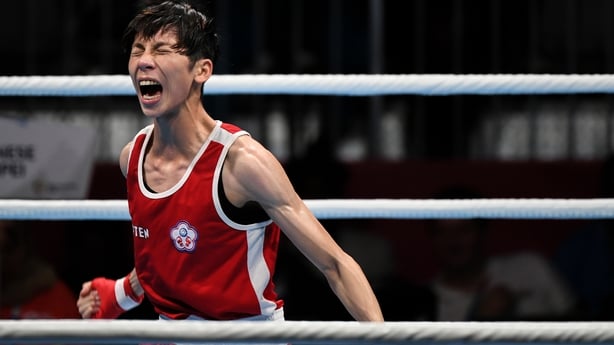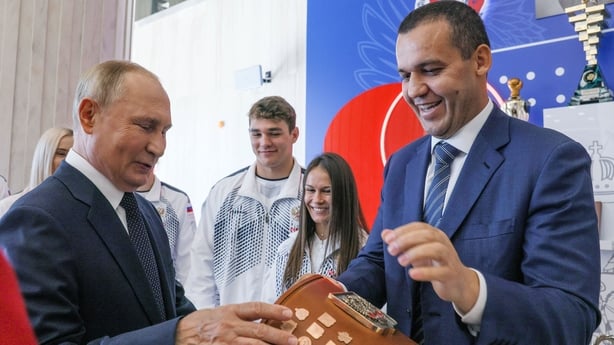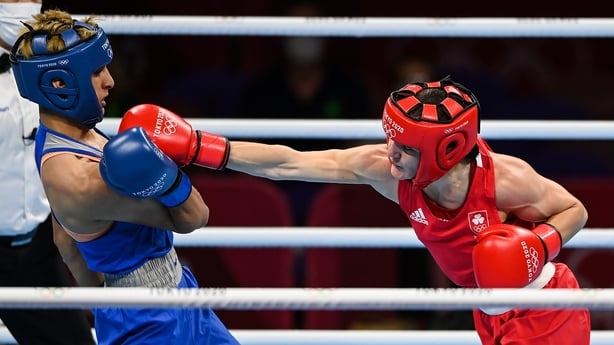Two Olympic boxers have found themselves at the centre of a fractious controversy in recent days, following a decision by the International Olympic Committee (IOC) to allow them to compete in Paris.
Thousands of comments - and numerous news articles – have claimed Algeria's Imane Khelif and Taiwan’s Lin Yu-Ting are "biological men" who should not be allowed to compete in women’s boxing.
One video of Khelif fighting in 2022 has been reposted by 37,000 accounts on X in recent days, receiving millions of views. It describes her as a man "cheating in the Olympics."
Yet an examination of the evidence for such claims made against both boxers shows they appear based almost wholly on a single statement from a Russian official published in the form of a Telegram post last March.
While much of the reporting and commentary has described the two boxers as 'transgender' there is also no evidence or public pronouncements that show either athlete identifies as transgender.
They have both competed as women throughout their careers.

In recent years, gender eligibility has become a growing controversy in relation to sport and since the most recent Tokyo Olympics some sports bodies have updated their gender rules.
Several of these governing bodies now ban athletes who went through male puberty from competing in women’s events. However, there is also no available evidence to support the idea that either of the boxers at the centre of the controversy went through male puberty.
Regardless, the issue has been brought up at IOC press conferences and covered widely in international media in recent days.
The basis for the claims
The claims relating to Khelif and Lin stem back to an event organised by the International Boxing Association (IBA) in New Delhi, India, in March 2023.
The IBA, previously known as the AIBA, governed amateur boxing - including Olympic boxing - from 1946 to 2019, when its Olympic recognition was suspended in what was widely seen as the culmination of decades of corruption.
Then in 2023, the IOC made a decision to formally strip the organisation of its recognition citing "financial transparency" and issues around "fairness in the appointment of judges and referees."
As a result, the Paris Olympic boxing tournament is overseen directly by the IOC.
Both Khelif and Lin qualified for the Paris games by coming through qualification events organised by the IOC.
These followed the New Delhi IBA event from which the controversies stem.
During that event, IBA president, Russia’s Umar Kremlev posted on his Telegram channel that DNA tests had "proved" both Imane Khelif and Taiwan’s Lin Yu-Ting "had XY chromosomes and were thus excluded from the sports events".
His Telegram comments were then reported by Russian news agency TASS.
Update: In the hours after this article was first published, the International Boxing Association (IBA) circulated a new public statement to international media. In it, the IBA says the disqualifications of the boxers were based on "recognised testing."
The statement says: "the athletes did not undergo a testosterone examination but were subject to a separate and recognised test, whereby the specifics remain confidential. This test conclusively indicated that both athletes did not meet the required necessary eligibility criteria and were found to have competitive advantages over other female competitors."
It said the decisions were ratified by the IBA Board of Directors.

The ruling against Khelif was made just hours before she was due to compete for a gold medal against Chinese boxer Yang Liu, and after Taiwan’s Lin Yu-Ting had already won a bronze medal at the event.
As a result, she was stripped of the medal, which was instead awarded to a Bulgarian fighter.
In his Telegram post on 25 March 2023, Kremlev said the disqualifications exposed "athletes who tried to deceive their colleagues and pretended to be women".
Khelif protested the decision saying: "I participated in many tournaments and there was no problem, but when my chances of winning the gold medal increased, they came and prevented me."
The updated IBA statement issued after the initial publication of this article said neither athlete has pursued an appeal against the claims to the Court of Arbitration for Sport.
Lin Yu-Ting also competed in previous IBA events when it was AIBA, winning gold in 2018 and 2019 tournaments.
Imane Khelif has a more mixed record. At the 2020 Tokyo Olympics (held in 2021) she was beaten by Kellie Harrington in the quarter-finals. A year prior to her disqualification in New Delhi, Amy Broadhurst, a multiple-time Irish champion, also defeated the Algerian in the final of the IBA-organised 2022 world championships in Istanbul.
Typically, when an athlete fails a test relating to a banned substance details are released about the testing process and results.
Prime Time asked the IBA to provide details relating to the DNA tests it says were conducted. In a statement the IBA said the decision to disqualify both boxers "was made following a comprehensive review and was intended to uphold the fairness and integrity of the competition."
When asked to provide details of this 'comprehensive review,' the IBA said it had "no further comments" to make.

As the controversy surrounding their participation grew throughout Tuesday afternoon, IOC spokesperson Mark Adams spoke to media members in Paris.
"Everyone competing in the women's category is complying with the competition eligibility rules. They are women in their passports and it is stated that is the case," he said.
"They are eligible by the rules of the federation, which was set in 2016, and which worked for Tokyo too, to compete as women, which is what they are. And we fully support that," Adams added.
Lin Yu-Ting is top-seeded in the women’s 57kg featherweight class. That’s the same weight class as Ireland’s Michaela Walsh, and the two could square off if they both come through their early bouts.
Khelif is the number five seed in the 66kg welterweight category, she is set to face the Italian Angela Carini on Thursday.
Khelif has long been considered an outsider for a gold medal in Paris, but following the controversy erupting on social media in recent days she has been backed into favourite with several major bookmakers.
Joe O’Neill, a reporter with irish-boxing.com who has covered domestic and international amateur boxing events for years, says the discourse around the two boxers is unfair given the IBA’s role in their disqualification.
"There’s no proof to support these claims from a reputable organisation and the coverage has been very selective. It’s too early to say anything without any actual proof," he said.
The Irish Amateur Boxing Association (IABA), which governs the sport in Ireland, is a member of the IBA.
In August 2023, IABA members voted to remain affiliated to the IBA. However, it is expected that the organisation will seek to join World Boxing in the future. World Boxing presents itself as an alternative to the troubled and controversial IBA, and hopes to organise Olympic boxing events in the future.
IOC rules on gender eligibility
The advice published by the IOC in 2021 to help give governing bodies support in determining rules around gender eligibility stated that no athlete should be excluded from competing based on an "unverified, alleged or perceived unfair competitive advantage due to their sex variations, physical appearance and/or transgender status."
The IOC document is not legally binding, but it clearly states what it expects from governing bodies responsible for regulating their own sports.
"Athletes should be allowed to compete but unfair advantage needs to be regulated," the IOC document says.







